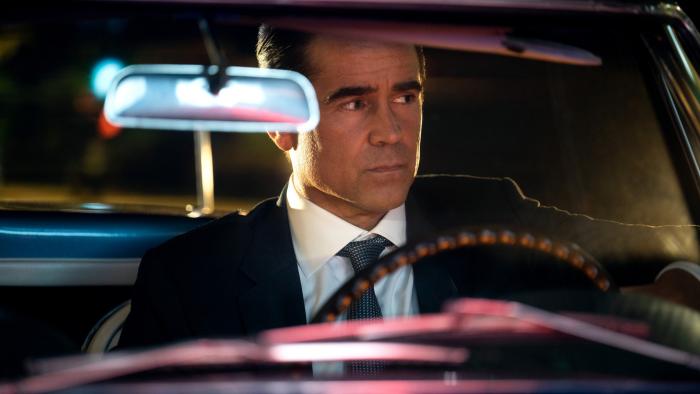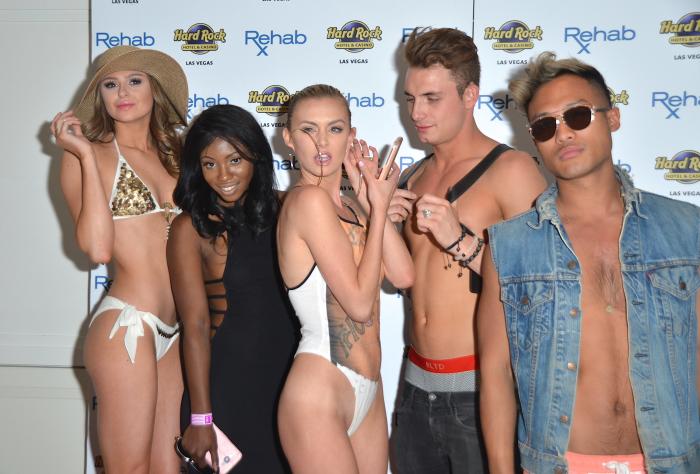

There is No Way ‘Sugar’ Will Survive a Week-to-Week Rollout
By Lindsay Traves | TV | April 8, 2024 |
By Lindsay Traves | TV | April 8, 2024 |

If a first season is to later function as a prologue, it’s important for it to stand on its own two legs long enough to maintain a viewership. Upon reflection, the first season of Westworld (RIP) becomes a series setup but while watching it, viewers were able to enjoy the mysteries within. 1899 took a similar swing, perhaps leaving us unsatisfied by its finale twist but still doing enough to keep the audience ready to click through to the next episode. Sugar, Apple TV+’s latest drama and noir-tinted-detective tale, seems to try the same, burying its lead in its finale, but the remainder of the series does not have enough going on to maintain the viewership until its somewhat flaccid reveal.
Farrell leads as the mysterious John Sugar, an enigmatic and magnetic hardboiled private detective with a well-fitting suit and affinity for flowery narration. Or maybe he’s a bit of a fanboy yutz, someone living in a fantasy portraying a faux version of a person he wishes he was that he created out of his love for Hollywood classics and a hero complex. Ever the good-guy, Sugar is tested when he’s commissioned by one of his film heroes to locate his missing granddaughter. Despite the objections of his handler, Ruby (Kirby Howell-Baptiste), Sugar pursues the missing young woman, finding himself entangled with her family and friends and mixed up in a mystery much greater than that of a runaway addict. As he slinks closer to the truth, Sugar’s nice-guy-isms and belief in the bettering of humanity are shaken by Ruby and his colleagues’ insistence on trying to stop him. So what’s the secret as to where the woman is and why his agency is trying to prevent him from discovering it? It’s difficult to spend too much of our fleeting time wondering.
Sugar isn’t a mystery box any more than an episode of CSI. Sure, there’s the intrigue associated with discovering just who the killer is, but it’s more of a comfortable ride where the procedural is in control of how quickly it reveals the pertinent information. Sugar isn’t dropping any clues. What it does do is hint that there’s something else going on with our lead, something that may or may not be worth chasing, and that doesn’t reveal itself until well into the back half of the eight-episode season. Its coyness is its downfall, and it seems impossible that an audience will rush to their televisions week-to-week for a short episode that is holding cards so closely to its chest, that it’s hard to even know if there is a mystery that will be solved.
The only way any of this works is, of course, because of Farrell’s uncanny acting ability, which allows him to add subtle mannerisms to something as inert as a modest smile that makes it all seem disingenuous. You might find yourself muttering “literally what is the guy’s deal?” as he imbues something normally attractive with a sense of ick. It’s his performance that leaves you feeling like this detective might have more in common with the leads of Memento and Shutter Island than of Chinatown and Hollywoodland. It’s his work that suggests there’s anything more going on than a simple noir homage.
It’s that and the style that tries to hold the loose pieces together suggesting more than meets the eye, and not anything else in the series like a mysterious cryptic conversation or hints about what is dangerous and who might be involved in the espionage. The rest is perhaps a meta-tale, scenes intercut with those of classic movies, some that only exist in-world as creations of Sugar’s client. Sugar drives an old-fashioned car, speaks like a man of another era, and seems locked into a pretend version of the world while still trying to improve it. Is it an homage, parody, or the headcanon of an internet fanboy? Sometimes it’s difficult to know.
For all its narrative failings, the show thrives on its style. Sugar is dropped into contemporary Las Angeles, its appearance and political nuances informing the look and the story. It’s Sugar, the eccentric private dick, who insists on his vintage automobile and journaling like a man desperate to emulate Sin City more than Sunset Boulevard. Toggling from black-and-white to vibrant color and allowing the narration only to be present in Sugar’s detective scenes creates an intriguing sense of timelessness that lends to the wonder. Camera tricks like cropping just Sugar into the corner of the frame with his passenger offscreen reminds us when Sugar is living in his own world, a world outside of reality or our own. It’s effective enough even if it has far too many Dutch angles to the point of being nauseating.
What do we make of a series led by one of our greatest actors, on one of the few (if not the only) streaming networks that seems to prioritize quality over quantity, that seems to thrive on weekly episode releases, and one that often gets caught up in hardened mysteries and science fiction twists? I don’t know, but I do know that Sugar is going to have to coast on Farrell’s good faith to ask the audience to bear with them for a promise of something more than a simple detective show about a missing girl that has a stylistic twist.
The first two episodes of Sugar hit Apple TV+ on April 5th and will drop weekly thereafter
← Review: 'The People's Joker' Is One of the Best and Most Subversive Comic Book Movies | RIP True Love? Timothée Chalamet And Kylie Jenner Might Be Over →
More Like This
There is No Way ‘Sugar’ Will Survive a Week-to-Week Rollout
‘Drag Race’ Star Q Has Somber Message for Fans: ‘Try To Be More Kind’
‘Vanderpump Rules’ Alum Faith Stowers Suing Network for Racial Harassment
Oliver Stark of '9-1-1' Is Not Interested In Your Homophobia
End of an Ehh-ra

‘Vanderpump Rules’ Alum Faith Stowers Suing Network for Racial Harassment
Star Of 'Civil War' Said It Was Hard To 'Shake It Off' After Filming
Molly Ringwald Watched This John Hughes Movie With Her Daughter, Says It Hasn't 'Aged Well'
Jonathan Majors Sentenced to Domestic Violence Counseling
Scarlett Johansson and Channing Tatum Fake the Moon Landing in 'Fly Me to the Moon'
Oliver Stark of '9-1-1' Is Not Interested In Your Homophobia
More Like This
There is No Way ‘Sugar’ Will Survive a Week-to-Week Rollout
‘Drag Race’ Star Q Has Somber Message for Fans: ‘Try To Be More Kind’
‘Vanderpump Rules’ Alum Faith Stowers Suing Network for Racial Harassment
Oliver Stark of '9-1-1' Is Not Interested In Your Homophobia
End of an Ehh-ra
Reviews